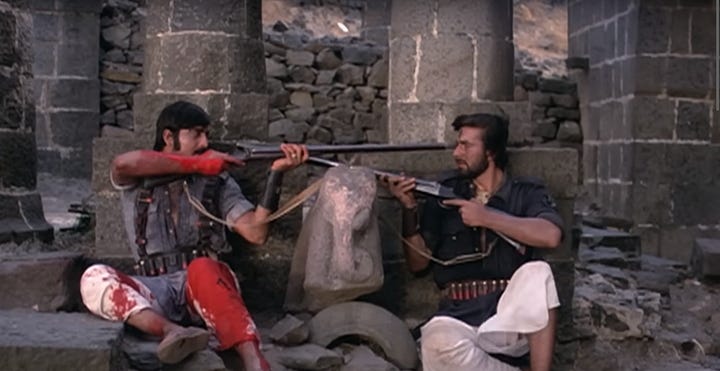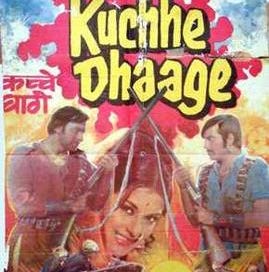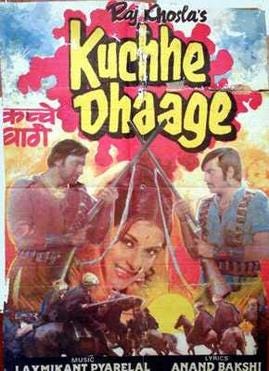Kucche Dhaage is the story of two dacoits entangled in a family and caste feud that ultimately unites them in death. Lakhan, a Thakur, is in pursuit of Roopa, a Brahmin, when they both fall in love with an innocent village girl. In their effort to protect her, they will face the law and order of the country.
First thing to note is that Kucche Dhaage was directed by Raj Khosla who made two excellent dacoit films, Mera Gaon Mera Desh, and this one, Kucche Dhaage. Both films precede Sholay; Salim Javed have been repeatedly accused that they lifted the basic plot of Mera Gaon Mera Desh for Sholay. Putting Khosla’s unsung contributions to Hindi film on the side, he doubled in multiple other genres, creating some of the most iconic films, like CID for noir.
The film’s opening scene depicts what is called in English a feud between two families: the younger sons are raised to seek revenge for their slain fathers from the antagonist's family. Weirdly enough, we do have a tradition like that in Greece also, called Vendetta. This custom is known to have wiped out entire families; it’s a hereditary revenge that can continue through several generations. At the beginning, it looks like the families in Kucche Dhaage are going to walk that same path.
In the first half of the movie, we witness the ways in which our two protagonists come to be morally compromised. Both have similar origin stories and they follow parallel trajectories as they grow up: family honor and revenge take precedence over everything else, including a healthy emotional development. The result? They both end up becoming monsters in human form. By this duplication of their predicament we the audience are made to understand that Lakhan and Roopa are two sides of the same coin. They even look alike, both being tall and broad (and handsome if I may add…), as Roopa’s mother points out in a scene later in the film This common visual, moral and emotional trajectory binds them together in an inescapable dance of fate, which they can resolve only when they come one against the other.
The film takes its sweet time until the interval to showcase how Roopa and especially Lakhan are transgressors not only of common human law and morality but also of the dacoit moral code. These dacoit rules are explained to us through a narrative device, Lakhan’s uncle and fellow daku who chastises him when he goes over the boundary. Lakhan violates that boundary when he rapes a girl from his own village, someone his mother is related to so he has to pay for it. In the course of the film he steals a girl so he has to save a girl, but also to die at the end since he is not able to honor the dacoit code. From a mythological construction point of view this makes for quite a nice balance of justice and injustice! Nevertheless, the movie can be quite disturbing in parts as rape looks very fashionable, it occurs more than once… However, I need to point out that only when a “proper” girl is raped, do people react; the abduction and rape of tawaif only horrifies her sister but not the entire village.
Despite these disturbing traits, character development is one of the strong assets of Kucche Dhaage. For example, there is a noticeable change in the way Lakhan connects with the world emotionally throughout the movie. At first, Vinod Khanna plays the cold-hearted Lakhan with a stone-like cruelty and distance of emotion. But as he gets to know Sona, the innocent village girl, and his heart starts having a beat, he emotes more convincingly. I do still wonder though if that was a directorial choice or simply Vinod was bored at the beginning…
Finally, Sona’s choices make her all that more endearing. Both hardened criminals are in love with the innocent girl but she is in love with a laddoo of a man, as she should! Her love interest is not some otherworldly hero, but a very timid, everyday sweet man that she fights till the end, with the help of the two dreadful criminals on her side, to win him over. Quite a modern spin on a traditional set up!
Negotiating Line - Punishment of the dacoit.
In my eyes, the allure of Kucche Dhaage owes a lot to how it treats one of the common narrative tropes of the dacoit films: the punishment of the dacoit at the end.




The final scene is an almost operatic shoutout between the two now united dacoits against the police over a backdrop of dramatic, black ruins. They both give their life to protect the marriage ceremony of the girl who made them change their ways. Punishment in dacoit films comes usually in the guise of jail time or death for our condradictory protagonist. Here, the anticipation of that punishment, delivered at the final scene, is prolonged considerably and involves the reason for the dacoit’s redemption (Sona, the innocent village girl) but also the state powers that deliver the punishment (the local police), all enmeshed in a gloriously melodramatic and very noisy shout-out. The death of the two dacoits is almost a celebratory occasion, not less because it is combined with a wedding. Their death, their sacrfice, enable the uniion of two innocent souls, in place of two criminal souls, two unredeemable souls. Story structure -wise it’s a well-balanced proportion of divine punishment (karma finally gets them), but at the same time fits with the standard trope of dacoit films, that no dacoit gets away at the end.
Dacoits, including Lakhan here, are essentially tragic heroes, since they often die at the end, just like Dilip Kumar in “Gunga Jumna”. In that sense, they don’t follow the familiar Hollywood hero’s journey. But can a dacoit really find redemption in the eyes of state and the law, like in “Jis Desh Mein Ganga Behti Hai” or even “Bandit Queen”? Not in this film; Lakhan and Roopa have to be killed for their crimes. But they go out like fireckrackers, only after they carry out an honorable and self-sacrificial act, that redeems them at least in the eyes of the audience, and gives us the opportunity to empathize with them, as we should, since they are the protagonists. What the film chooses not to do is redeem them in the eyes of filmy (or mythic) justice, and I should also say, State justice.
Another interesting element of the movie is that it mentions caste so explicitly, unique for a daku film that old. The caste of the protagonists is even stated in the starting credits. It deals with the issue as a simple narrative trope, as an excuse for the intense rivalry between the protagonists, not as a social order that needs to be opposed like in “Bandit Queen”. Also, both Thakurs and Brahmins are upper castes (if I am not mistaken) so I didn’t quite grasp the reason for their rivalry, except a as a fight for who’s gonna be on top. To note then is that since at least the 70’s Dacoit films grappled with caste but only later on in the 90s caste is given a different treatment, although the seed is already there.
On a final note, this movie is filled with great close-ups of the protagonists’ handsome faces - reason for the ladies to watch dacoit films instead of Westerns - the men are more handsome!
Kucche Dhaage is available on YouTube with English subtitles on Shemaroo’s YouTube Channel:





